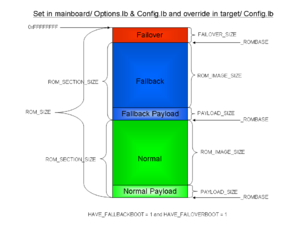Welcome to coreboot: Difference between revisions
Jump to navigation
Jump to search
mNo edit summary |
mNo edit summary |
||
| Line 12: | Line 12: | ||
<small>There are many reasons for using coreboot.</small> | <small>There are many reasons for using coreboot.</small> | ||
<hr /> | <hr /> | ||
<small> | |||
* 100% Free Software (GPL), no royalties, no license fees! | * 100% Free Software (GPL), no royalties, no license fees! | ||
* Fast boot times (3 seconds from power-on to Linux console) | * Fast boot times (3 seconds from power-on to Linux console) | ||
| Line 19: | Line 20: | ||
* Supports a wide variety of [[Supported Motherboards|mainboards]], [[Supported Chipsets and Devices|devices]], and [[payloads]] | * Supports a wide variety of [[Supported Motherboards|mainboards]], [[Supported Chipsets and Devices|devices]], and [[payloads]] | ||
* Further features: netboot, serial console, remote flashing, ... | * Further features: netboot, serial console, remote flashing, ... | ||
</small> | |||
|style="vertical-align:top"| | |style="vertical-align:top"| | ||
'''<span style="font-variant:small-caps;">[[Use Cases]]</span>''' — | '''<span style="font-variant:small-caps;">[[Use Cases]]</span>''' — | ||
<small>coreboot can be deployed in a wide range of scenarios.</small> | <small>coreboot can be deployed in a wide range of scenarios.</small> | ||
<hr /> | <hr /> | ||
<small> | |||
* Standard desktop computers and servers | * Standard desktop computers and servers | ||
* [[Clusters]], high-performance computing | * [[Clusters]], high-performance computing | ||
* Set-Top-Boxes, thin clients | |||
* Embedded solutions, appliances, terminals | * Embedded solutions, appliances, terminals | ||
* [http://en.wikipedia.org/wiki/Small_form_factor Small form factor computers], [http://en.wikipedia.org/wiki/Home_theater_PC Home-theater PCs] (HTPC) | * [http://en.wikipedia.org/wiki/Small_form_factor Small form factor computers], [http://en.wikipedia.org/wiki/Home_theater_PC Home-theater PCs] (HTPC) | ||
* No-moving-parts solutions (ROM chip as "hard drive") | * No-moving-parts solutions (ROM chip as "hard drive") | ||
* Various non-standard scenarios (e.g. FPGA in Opteron socket) | * Various non-standard scenarios (e.g. FPGA in Opteron socket) | ||
</small> | |||
|} | |} | ||
<hr /> | <hr /> | ||
Revision as of 01:29, 12 March 2008
|
coreboot (formerly known as LinuxBIOS) is a Free Software project aimed at replacing the proprietary BIOS (firmware) you can find in most of today's computers. It performs just a little bit of hardware initialization and then executes a so-called payload, for example a Linux kernel, FILO, GRUB2, OpenBIOS, Open Firmware, SmartFirmware, GNUFI (UEFI), Etherboot, ADLO (for booting Windows, FreeBSD, or OpenBSD), Plan 9, or memtest86.
|

Contact
|





